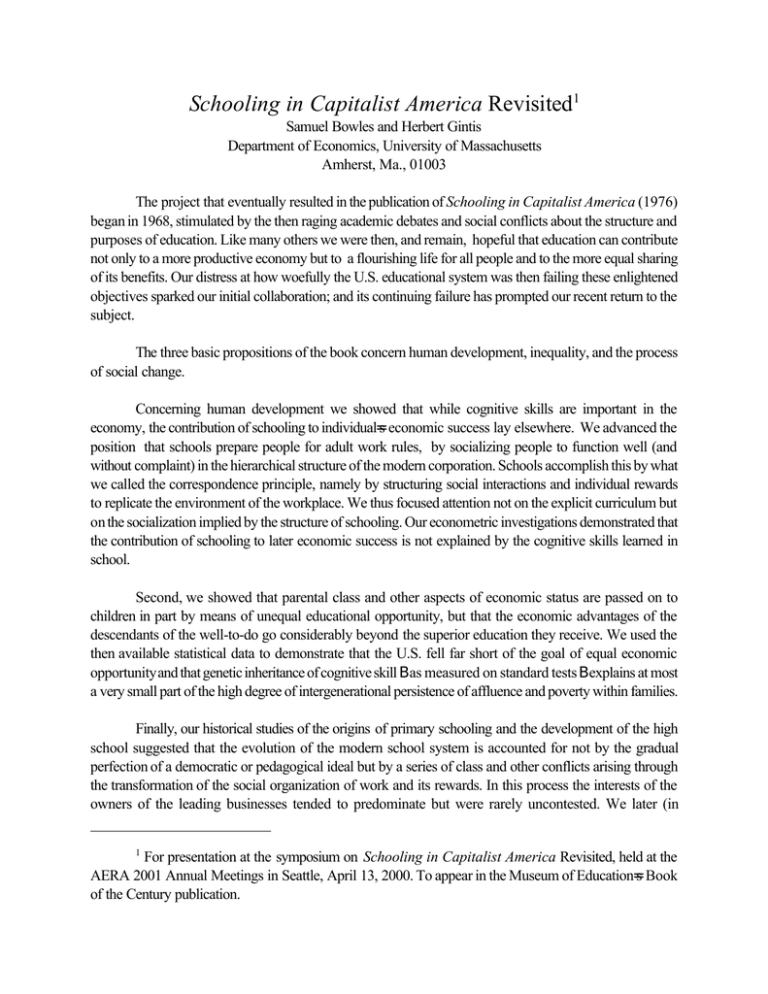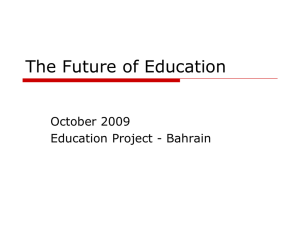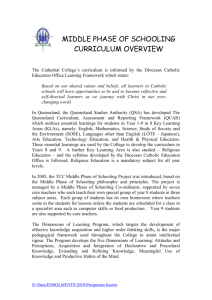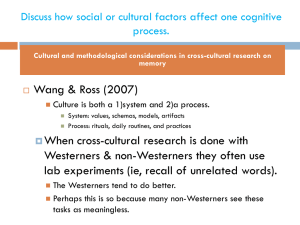Schooling in Capitalist America
advertisement

Schooling in Capitalist America Revisited1 Samuel Bowles and Herbert Gintis Department of Economics, University of Massachusetts Amherst, Ma., 01003 The project that eventually resulted in the publication of Schooling in Capitalist America (1976) began in 1968, stimulated by the then raging academic debates and social conflicts about the structure and purposes of education. Like many others we were then, and remain, hopeful that education can contribute not only to a more productive economy but to a flourishing life for all people and to the more equal sharing of its benefits. Our distress at how woefully the U.S. educational system was then failing these enlightened objectives sparked our initial collaboration; and its continuing failure has prompted our recent return to the subject. The three basic propositions of the book concern human development, inequality, and the process of social change. Concerning human development we showed that while cognitive skills are important in the economy, the contribution of schooling to individual=s economic success lay elsewhere. We advanced the position that schools prepare people for adult work rules, by socializing people to function well (and without complaint) in the hierarchical structure of the modern corporation. Schools accomplish this by what we called the correspondence principle, namely by structuring social interactions and individual rewards to replicate the environment of the workplace. We thus focused attention not on the explicit curriculum but on the socialization implied by the structure of schooling. Our econometric investigations demonstrated that the contribution of schooling to later economic success is not explained by the cognitive skills learned in school. Second, we showed that parental class and other aspects of economic status are passed on to children in part by means of unequal educational opportunity, but that the economic advantages of the descendants of the well-to-do go considerably beyond the superior education they receive. We used the then available statistical data to demonstrate that the U.S. fell far short of the goal of equal economic opportunity and that genetic inheritance of cognitive skill B as measured on standard tests B explains at most a very small part of the high degree of intergenerational persistence of affluence and poverty within families. Finally, our historical studies of the origins of primary schooling and the development of the high school suggested that the evolution of the modern school system is accounted for not by the gradual perfection of a democratic or pedagogical ideal but by a series of class and other conflicts arising through the transformation of the social organization of work and its rewards. In this process the interests of the owners of the leading businesses tended to predominate but were rarely uncontested. We later (in 1 For presentation at the symposium on Schooling in Capitalist America Revisited, held at the AERA 2001 Annual Meetings in Seattle, April 13, 2000. To appear in the Museum of Education=s Book of the Century publication. Democracy and Capitalism) developed the idea that schools and the public sector generally are loci of conflicts stemming from the contradictory rules of the marketplace and the democratic polity. How do we now view this work? For most of the intervening quarter of a century we have researched and taught subjects quite removed from the questions we addressed in Schooling. In recent years, however we have returned to writing about school reform, how economic institutions shape the process of human development, and the importance of schooling, cognitive skill, and personality as determinants of economic success and their role in the intergenerational perpetuation of inequality. In light of the outpouring of quantitative research on schooling and inequality in the intervening years, the statistical claims of the book have held up remarkably well. In particular, recent research by us and others using far better data than was available in the early 70s has entirely vindicated our estimates of high levels of intergenerational persistence of economic status, the unimportance of the heritability of IQ in this process, and the fact that the contribution of schooling to cognitive development plays little part in explaining why those with more schooling have higher earnings. Some additional research has supported our hypotheses concerning the role of personality traits (rather than skills per se) as determinants of labor market success; but progress has been halting in this area. (We survey some of this recent research in recent and forthcoming papers in the Journal of Economic Literature (2001), the Journal of Economic Perspectives (2002) the American Economic Review (May, 2001), and the International Encyclopedia of the Social and Behavioral Sciences.) On current reflection, the main shortcomings of the book reflect the times in which we wrote. The long 1960s economic boom and the anti-materialist counter-cultural currents which it fostered perhaps led us to under-emphasize the value of schooling in contributing to productive employment. The more important shortcoming, we think is programmatic. We avoided for the most part the question of what schools should be, focusing instead on what schools actually are and do; nor did we devote much attention to how economic systems other than capitalism might better facilitate achieving the enlightened objectives of schooling. We took it as obvious that a system of democratically-run and employee-owned enterprises coordinated by both markets and governmental policies was both politically and economically viable as an alternative to capitalism. We remain convinced of the attractiveness of such a system, but are less sanguine about its feasibility, and more convinced that reforms of capitalism may be the most likely way to pursue the objectives which we embraced at the outset. While the book endorses the idea that radicals B even revolutionaries B must also be reformers, we provided little guidance to either policy makers, teachers, or students seeking practical positive steps to bring about long term improvements in educational structure and practice. Partly because we are now reasonably certain that we had the facts right, we remain committed to our overall approach to schooling B embedding the analysis of education in the evolving structure of the economy and the polity, and giving attention to the non-cognitive as well as conventional effects of education. Today, no less than during the stormy days when Schooling was written, schools express the conflicts and limitations as well as the hopes of a divided and unequal society; and they continue to be both testing grounds and battlegrounds for building a more just and freer society.






